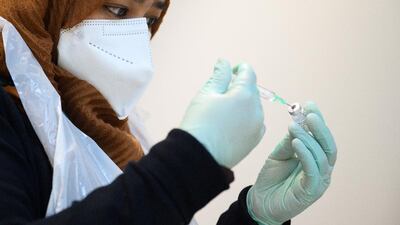The UK has begun the biggest vaccination campaign in its history as it tries to inoculate 13.9 million people in two months, in a bid to link the end of its national lockdown with the immunisation of vulnerable groups.
According to government data, more than 1.3 million people have been vaccinated across the UK since December 8, including nearly a quarter of the most elderly and vulnerable.
Who will get the vaccine first?
The Joint Committee on Vaccination and Immunisation says prevention of death and the maintenance of health and social care systems should be priorities. As the risk of death from Covid-19 increases with age, prioritisation is based primarily on this factor.
The JCVI has set out a list of nine high-priority groups, covering around 30 million people.
What are the nine priority groups?
- residents in a care home for older adults and their carers
- all those 80 years of age and over and frontline health and social care workers
- all those 75 years of age and over
- all those 70 years of age and over and clinically extremely vulnerable individuals
- all those 65 years of age and over
- all individuals aged 16 years to 64 years with underlying health conditions which put them at higher risk of serious disease and mortality
- all those 60 years of age and over
- all those 55 years of age and over
- all those 50 years of age and over
People aged over 80, frontline staff and care home workers will be given the priority.
Everyone over 70 and anyone who is clinically extremely vulnerable will receive the vaccine by mid-February, while the rest of the priority groups will receive it by Easter.
When will the second phase of vaccination begin?
The JCVI believes that the key focus for the second phase should be cutting the number of people in hospitals. The under-50s and those at increased risk of catching Covid-19 due to their occupation will be prioritised in the second phase. These include:
- first responders
- the military
- those involved in the justice system
- teachers
- transport workers
- public servants essential to the pandemic response
If you are part of this group, you will be invited to book an appointment for vaccination by late spring or early summer. Healthy, young people may have to wait until 2022.
The UK’s ambitious programme is being helped by a change to the dosage regimen. As both the Pfizer/BioNTech and Oxford/AstraZeneca products require two doses to provide the best protection, the strategy was to offer another dose 21 days after the first.
On December 30, the government announced that the two doses will instead be delivered within three months to vaccinate as many people as possible.
However, this is counter to the World Health Organisation recommendations, under which the doses should be administered 21 to 28 days apart, and the manufacturers themselves, who also voiced concerns over the schedule, claiming there was "no data" to support its effectiveness.

